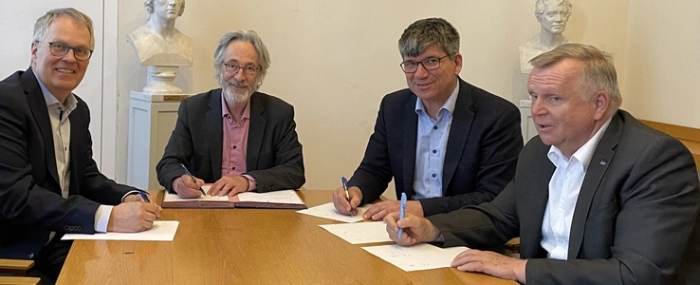
BAM, HZB, HU Berlin plan to establish Berlin Battery Lab
The lab will pool the expertise of the three institutions to advance the development of sustainable battery technologies. The joint research infrastructure will also be open to industry for pioneering projects in this field.
The Federal Institute for Materials Research and Testing (BAM), the Helmholtz-Zentrum Berlin (HZB), and Humboldt University of Berlin (HU Berlin) have signed a memorandum of understanding (MoU) to establish the Berlin Battery Lab.
The lab will pool the expertise of the three institutions to advance the development of sustainable battery technologies, according to a media release. The joint research infrastructure will also be open to industry for pioneering projects in this field.
The Berlin Battery Lab (BBL) will combine the strengths of the three partner institutions: BAM has internationally recognized expertise in battery safety and electrochemical energy materials. HU Berlin is a leader in Germany in academic research on sodium-ion batteries. HZB is particularly active in research on lithium-sulfur batteries.
The laboratory aims to accelerate the transfer of material developments into marketable products. In the field of basic research, material development ties in with the battery activities of the HZB large-scale research facility BESSY II.
The BBL activities culminate in the production of demonstrator cells and thus form an interface with safety and application tests. The collaboration between basic research, applied research, and certification enables a faster transition from research to industrial application.
The Berlin Battery Lab is open to industry partners from all over Germany and Europe and serves to promote the development and production of locally manufactured sustainable batteries, the media release said.
“The planned establishment of the Berlin Battery Lab is a significant step for sustainable battery research in Germany. Through close cooperation with the Helmholtz Center Berlin and Humboldt University, we are pooling our expertise and creating a unique research infrastructure,” said BAM President Prof. Dr. Ulrich Panne. “This will enable us to bring innovative and sustainable battery technologies to market more quickly and thus make an important contribution to the energy transition.”
“We will jointly advance the development of sustainable sodium and sulphur batteries with the combined expertise of HZB, BAM and HU — and thus make an important contribution to successfully shaping the energy transition,” said Prof. Dr. Christoph Schneider, Vice President for Research at HU.
“We have been cooperating with Humboldt University and BAM in the field of battery research for many years. We will now be able to significantly expand this cooperation. At the X-ray source BESSY II, which is operated by HZB, complete battery cells can be analysed in situ and during discharging and charging, i.e. operando. This gives us insight into the processes that lead to a gradual loss of capacity,” said Prof. Dr. Bernd Rech, Scientific Director of HZB. “By setting up a new pouch cell laboratory for sodium-ion batteries at HZB, we aim to strengthen materials research for batteries in Berlin and establish further collaborations with industry.”


